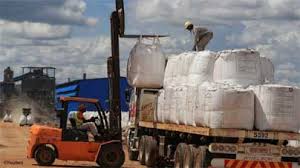HARARE, ZIMBABWE – The government of Zimbabwe has announced that it will stop all exports of lithium concentrate starting January 2027. This is part of its broader plan to boost local processing and create more value from the country’s natural resources, especially in the mining sector.
The ban was made public by the country’s Minister of Mines and Mining Development, Winston Chitando, during a press briefing after a recent Cabinet meeting. According to him, this decision follows an earlier ban on raw lithium ore exports, which was introduced under Zimbabwe’s National Development Strategy 1 (NDS1).
Minister Chitando said the country is now building enough capacity to process lithium locally. “Because of the processing capacity now being built within the country, from January 2027, no player will be allowed to export lithium concentrates,” he said. He added that the country is planning to upgrade its lithium sector to start producing battery-grade lithium sulphate, which is a major raw material for making electric vehicle (EV) batteries.
Lithium, which is found mainly in spodumene ore, is a key component in battery production for electric cars and renewable energy systems. Zimbabwe has some of the largest lithium reserves in Africa and has been identified as an important player in the global battery supply chain.
Minister Chitando called on mining companies to support the government’s move by setting up processing plants in the country. He urged miners who do not yet have value addition facilities to partner with others or make plans to meet the 2027 deadline.
Two of the biggest lithium mining companies in the country—Bikita Minerals and Prospect Lithium Zimbabwe (also known as Arcadia Lithium)—have already started building facilities that will process lithium into sulphate and other products for use in batteries.
Officials say this move will help Zimbabwe earn more foreign exchange, create jobs, and boost its economy through industrialisation. The country is trying to move away from being only a raw materials exporter and instead become a manufacturer of finished and semi-finished products.
In the same week, Information Minister Jenfan Muswere said the government is also continuing with its ban on the export of chrome ore, which is used to produce ferrochrome, an important material in stainless steel production. According to him, the Cabinet has instructed that all chrome producers must now focus on local processing.
New chrome mining licenses will only be given to investors who show clear plans for building smelting facilities, he said. In addition, companies that are not using their chrome mining licenses will have them withdrawn under the government’s “use-it-or-lose-it” policy.
The government said it wants to grow the ferrochrome industry and make sure that the country benefits more from its chrome deposits. Zimbabwe’s chrome sector currently has around ten major producers, with a combined production capacity of about 270,000 tonnes per year.
One of the biggest projects is the Palm River Project, which started operating in February 2025. The plant now produces about 100,000 tonnes of ferrochrome yearly, and it is aiming to increase that to 1 million tonnes, making it the largest in the country.
While the bans on lithium and chrome exports have been praised by some experts as steps in the right direction, others have warned that challenges could slow down the plans. Power shortages, poor road and rail infrastructure, and inconsistent policies have been pointed out as problems that could discourage investors and delay local processing projects.
There are also concerns about whether small and medium-scale miners will be able to afford the large investments needed to build processing plants.
Despite these concerns, Zimbabwe’s new policy reflects a growing trend across Africa. Countries like Namibia, Ghana, and the Democratic Republic of Congo (DRC) are also placing limits on the export of raw minerals. These countries want to increase local value addition and keep more profits from their natural resources within their borders.
The global demand for battery minerals like lithium is expected to keep rising as countries around the world push for more clean energy and electric vehicles. Zimbabwe wants to take advantage of this demand, but now with a focus on processing and exporting finished or semi-processed goods instead of just raw materials.
Whether the new policies will work as planned depends on how fast companies can build local capacity and how much support the government gives to help them overcome infrastructure and financing challenges.
